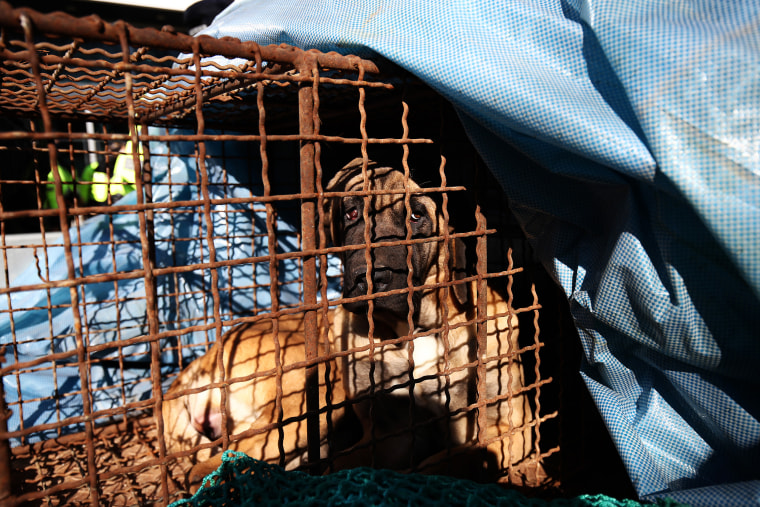SEOUL, South Korea — South Korean lawmakers passed a bill Tuesday to ban the consumption and sale of dog meat in a move cheered by animal welfare groups.
“This is history in the making,” JungAh Chae, the executive director of Humane Society International Korea, said in a statement.
“I never thought I would see in my lifetime a ban on the cruel dog meat industry in South Korea, but this historic win for animals is testament to the passion and determination of our animal protection movement,” she added.
Jeung Seung-yong, president of South Korean animal welfare group Catch Dog, said it had taken decades of campaigning to achieve the ban.
“Until now, about 100 small and large South Korean advocate groups worked together to increase awareness about the utterly cruel ways dogs, including stolen ones, were killed for eating,” said Jeung, whose group has shut down about 250 dog farms and rescued about 5,000 dogs since it was founded in 2019.
The centuries-old practice of eating dog meat has been fading in South Korea, though some older people, especially, still believe it provides health benefits during the hot summer. Up to 1 million dogs are farmed and killed in South Korea every year for human consumption, according to Humane Society International Korea.
The tradition stemmed in part from the needs of ordinary people with limited access to beef and other meat, and advocates of the ban had argued there was no longer any need to consume dog meat because South Korea is now an affluent society with the world’s 13th-biggest economy.

As South Korea has developed, dogs have surged in popularity as pets, with an estimated 6 million in Korean homes, Humane Society International Korea says. South Koreans often treat their pets as cherished family members, sometimes giving them burials as elaborate as those for humans.
President Yoon Suk Yeol has six dogs and eight cats with his wife, Kim Keon Hee, a vocal supporter of the ban.
Eighty-six percent of South Koreans say they have little or no intention of consuming dog meat in the future, according to the results of a survey released in September that was conducted by Nielsen Korea and commissioned by Humane Society International Korea. In the same survey, 57 percent of respondents said they would support a ban on the dog meat industry.
The ban had been opposed by farmers, restaurant owners and others involved in the dog meat industry, who said they would be harmed economically. In November, about 200 held a rally against the legislation, during which some protesters clashed with Seoul police.
In a statement on Tuesday, the South Korean Dog Consumption Association said those involved in the industry were “forced to become homeless because the government failed to provide rightful compensation for our loss.”
“We will fight with all means including releasing dogs to the street,” it added.

Agriculture Minister Song Mi-ryung said the government would work with the dog meat industry on a “reasonable and rational” compensation plan.
“South Korea is rapidly moving towards a society focusing on the welfare of animals, and the time is now for the South Korean government to act to resolve the problems of canine consumption,” she said.
Violations of the legislation, which takes effect three years from now, are punishable by up to three years in prison or 30 million won ($22,800) in fines.
“My work to end the practice of eating dogs in South Korea will not end until the three years of grace period is over as promised, and the actual law is imposed to really end the dog meat trade,” Jeung said.
South Korea joins a growing list of Asian countries and territories that have banned the dog meat trade, including India, Singapore, Thailand, the Philippines, Hong Kong and Taiwan.